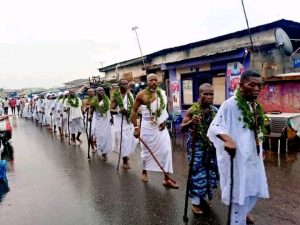|
Getting your Trinity Audio player ready...
|

The Akumase Festival in Senya Beraku, the Awubia Festival in Awutu Breku, and the Ga Homowo Festival in Accra all impose a ban on drumming. These festivals, established centuries ago by the high priest Atta Atie Kwesi Kwei, and first celebrated together by the three communities at present day Gomoa Nyanyano (Nya-nya-no means Ground of the Greatest Festival), mark the end of the farming season and the harvest of agricultural produce and fish.
Traditionally, the ban on drumming lasts from May to August and is strictly enforced by the local traditional authorities. However, due to modern socio-economic and political factors, the Senya Beraku Traditional Council has reduced the ban to three weeks, while the Ga Traditional Council has shortened it to one month.
The ban on drumming has previously caused conflicts between the Christian society and the traditional authorities. The Christian community objects to what they perceive as idolatry and a hindrance to their freedom of worship with drums and instruments. As a pastor, I understand this sentiment. However, after researching the history, tradition, and culture of our Guan and Ga traditional society, I now appreciate and embrace the ban while advocating for its proper application and observance.
One challenge is that the custodians of the traditions may not have adequately educated the masses to understand the essence and values of the ban. This lack of knowledge on the part of the masses has led to conflicts between the traditional authorities and the Christian society. It is important to remember that lack of knowledge leads to perishing, as the Bible states.
I advise the Christian community not to view the ban as idolatry or condemn it. Simultaneously, I urge the traditional authorities to focus on the ban’s purpose and value, rather than merely the rituals associated with it. The Akumase, Awubia, and Homowo festivals, which span from January to August, constitute a well-structured farming system. These festivals encourage diligent farming practices that result in abundant harvests. The ban on drumming, which begins in May, ensures that people refrain from activities that might hinder their commitment to their crops.
The ban encompasses not only drumming but also funerals, parties, and all forms of entertainment and noise-making. In ancient times, drumming accompanied all types of entertainment, unlike today’s reliance on sound systems. The ban lasts for three months, starting from the Awudu or Nmadumo mini festival in May, until the Odada mini festival, which signals the lifting of the ban and the start of the harvest.
I believe this important practice deserves greater attention from an economic perspective. It should be seen as more than a ban on drumming but rather as an opportunity to instill the values of hard work, focus, and discipline into our society and the younger generation. It should be a period for organizing seminars and symposiums on entrepreneurship, business, financial literacy, and related topics. Traditional authorities should collaborate with corporate institutions to engage with the youth, provide training, and support small businesses in the community. Additionally, the ban period could be used to review government employment policies and their impact on traditional areas and the youth.
I will be greatly joyful to see the reintroduction of the values, purpose and wisdom of our ancestors in modern society for the purpose of reaping the socio-economic benefits they envisioned when they laid down the customs and traditions. Just as our forefathers fought for Ghana’s independence, we must remember that our ancestors also sacrificed and achieved independence from famine and death through sound agricultural practices, including the ban on drumming, which has been carefully handed down to us.
Watch out for my soon-to-be-released book on Amazon: “Senya Beraku Festival” for more details.
Abeiku Okai
Anathallo Chapel Int.
(+233) 0249287855
19.05.2023